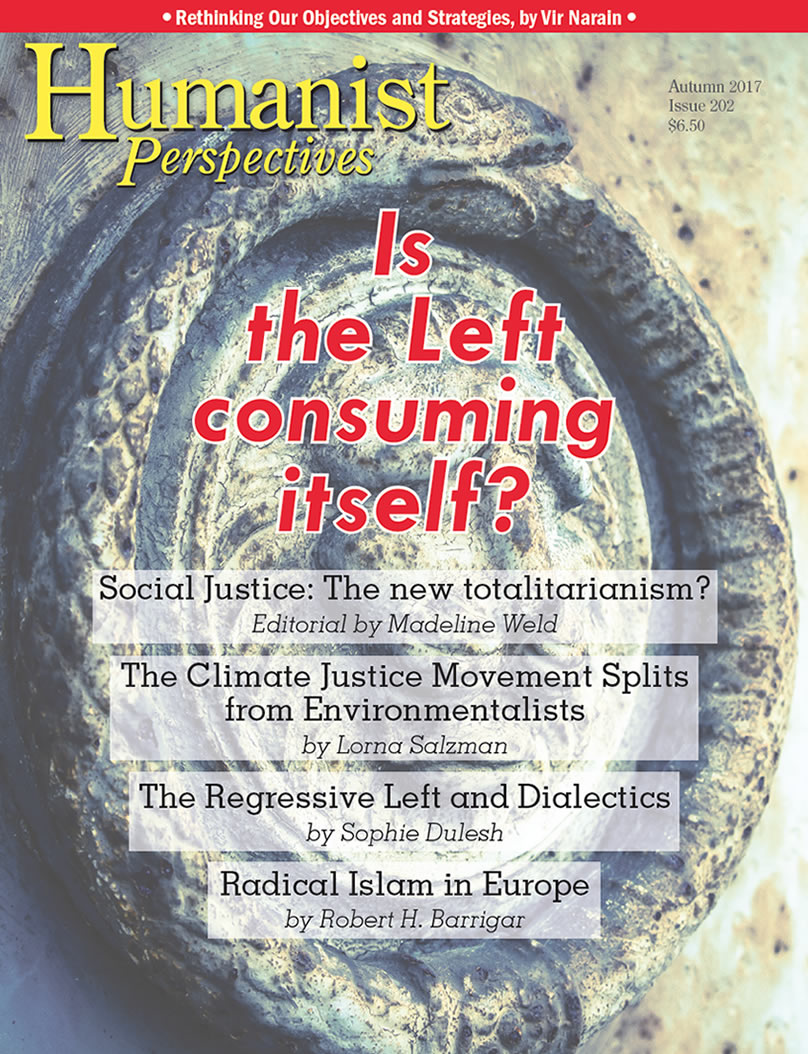Humanist Perspectives: issue 202, Autumn 2017
Issue 202, Autumn 2017

Humanist Perspectives is a refreshing, rational analysis of modern events and culture and is available at select magazine stores or by online subscription.
Editorial
- Social Justice – the new totalitarianism?
-
My position on most issues has not changed dramatically over the last five decades or so... But whereas my views would once have been considered centrist, even a bit to the left, they are now considered right-wing and I’m told someone even referred to me as a “right-wing radical.” What happened?
Read editorial onlineDownload as PDF
Features
- The Climate Justice Movement Splits from Environmentalists
-
The science behind climate change is well known... The lack of a commensurate response to this situation is due to disastrous economic policies intended to maximize economic growth, production and overconsumption, all promoted by the underpricing of energy, plus a lack of adequate regulation. As a result, we are headed towards a point of no return that will inevitably condemn human societies to ecological and social chaos. All the most progressive social policies in the world will not prevent this.
Read article online Download as PDF
- The Regressive Left and Dialectics
-
... The Regressive Left believes that it is fighting against The Evil: the neocolonialist West exerting state-organized violence through military invasions. However, the same Regressive Left shies away from criticizing the violence of Islamic extremists; it is ready to ally itself with the most repressive organizations to avoid at any cost the appearance of being Eurocentric or – heaven forbid! – seeming to consider some cultures as perhaps less advanced in some ways.
Download as PDF
- Our Nature is Not Our Fate
-
Herr Martin Pfeiffer, my thanks to you and to the Gesellschaft für freie Publizistik for awarding me the Ulrich von Hutten prize. My thanks also to Alfred Zips, Gerd von Schultze-Ronhof, and Ernst von Heydebrand, who took part in the preparation for this event.
I speak to you today in the name of the dead of two wars and in sorrow for the vast delusions which killed them, delusions which continue today. I am going to offer you consolation, explanation and possibly a solution.
Download as PDF
- Rethinking Our Objectives and Strategies
-
When the International Humanist Movement came into being in 1952 with the founding of the International Humanist and Ethical Union (IHEU), its declared mission was to provide an alternative to “traditional religions which claim to be based on revelation on the one hand and totalitarian systems on the other.”... We need to ask ourselves how far we have succeeded in achieving this objective. Is the world less afflicted today by religious intolerance and sectarian conflict than it was in the middle of the last century? Have totalitarian systems given way to democratic governments? And – most importantly for Humanists – if any progress has been made in these areas, what has been the contribution of the Humanist Movement as such? What strategies, if any, have we adopted for achieving our objectives and how effective have they been?
Read article onlineDownload as PDF
- Radical Islam in Europe and the Siren Song of Multiculturalism
-
There are words that invoke many different meanings, some of them incompatible with one another... Other words embrace so many disparate concepts that they frequently frustrate analysis, dialogue and explanation, and lead to misunderstandings between people... One such word in the latter category is “multiculturalism.”... In a broad sense, “multiculturalism” means the coexistence and tolerance of several cultural or ethnic groups within a society... Andrew Heywood in his book Political Ideologies notes that the word may have either a descriptive function or a normative function: “As a descriptive term, it has been taken to refer to cultural diversity … As a normative term, multiculturalism implies a positive endorsement, even celebration, of communal diversity, typically based on either the right of different groups to respect and recognition by others, or to the alleged benefits to the larger society of moral and cultural diversity.”
Download as PDF
Book reviews
- Review of James Bacque’s “Spirit Builders: Charles Catto, Frontiers Foundation, and the Struggle to End Indigenous Poverty”
-
This generously illustrated title is a loving tribute to the oft-forgotten postwar social engagement by many men and women of the cloth....
Download as PDF
- Review of Tom Nichol’s “The Death of Expertise : The Campaign Against Established Knowledge And Why It Matters”
-
This new book, written by a professor of National Security Affairs at the US Naval War College and an adjunct professor at the Harvard Extension School, is must read.....
Download as PDF
- In addition, Humanist Perspectives offers a lively Letters-to-the-Editor section as well as Book Reviews, books available for review and snippets of international news of interest to humanists.